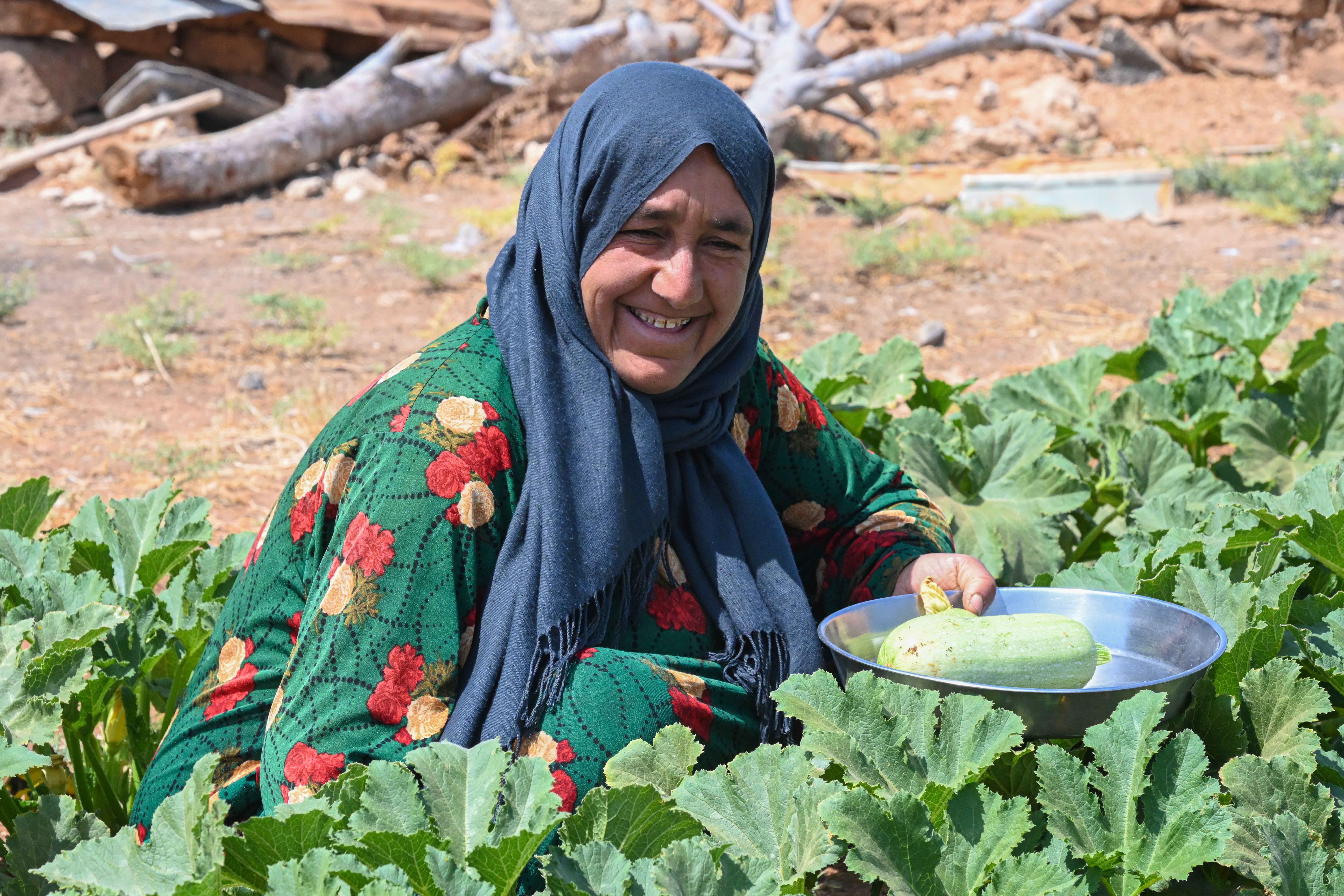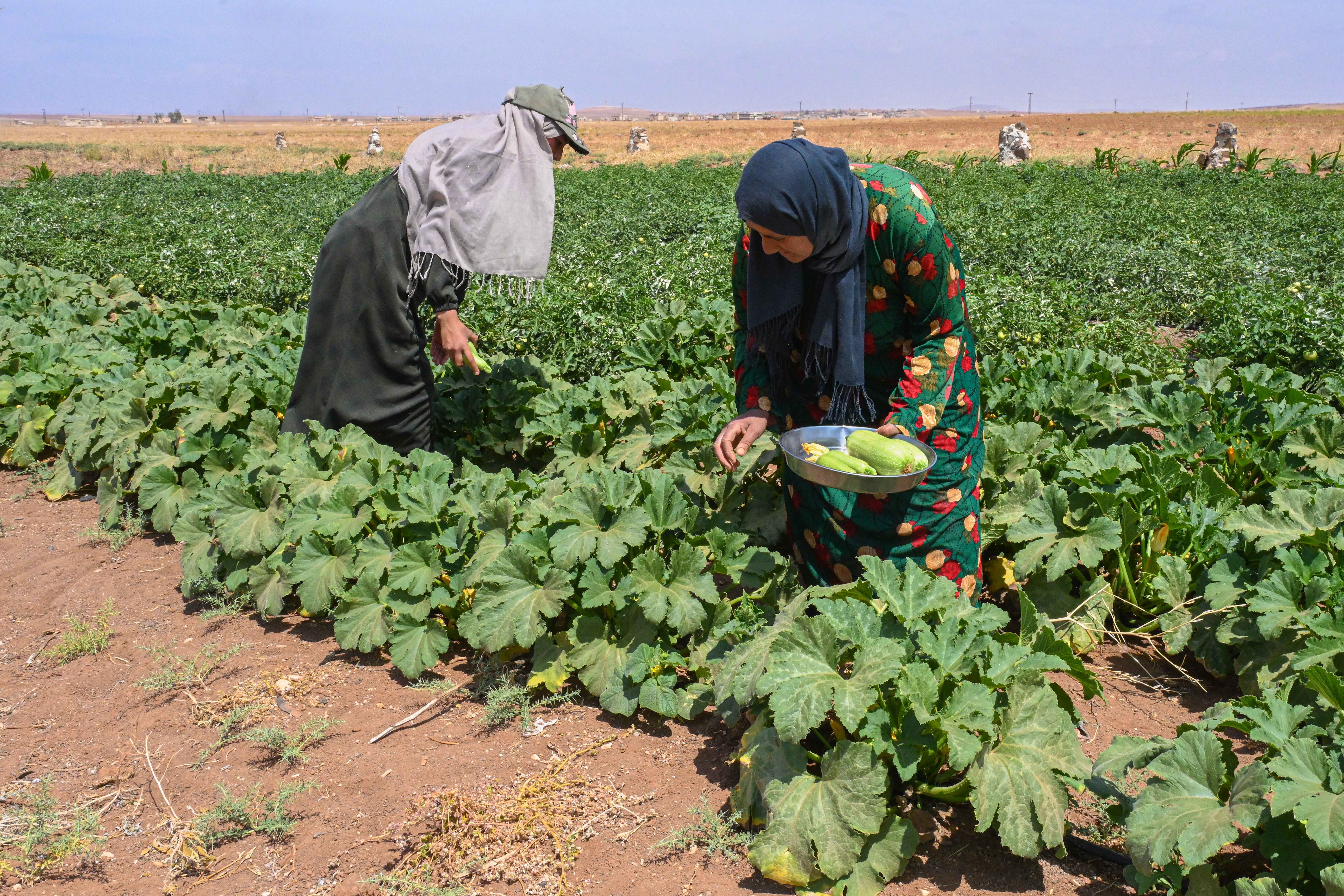With Water Management and Farming, Everything Comes Alive
July 3, 2023

Getting the best out of the land. Jouriyah picking courgettes from her land
Jouriyah Al Khalaf is 45 years old from a small village called al-Hardanah in Tal ad-Daman, in rural Aleppo. Jouriyah lost her husband during the COVID-19 pandemic, and she was left as the sole breadwinner for her nine children.
“We were getting by on my husband's salary before he passed away in addition to whatever income I got from farming neighbouring land and our plot to cover family expenses. The armed conflict in the area and the resulting lack of services impacted us, and became a struggle to survive. We had to leave our home for a few months before returning back to the area in 2016. Deciding to come back was a tough call for us, and it ended up costing us a lot,” said Jouriyah. She and her family had to borrow money from relatives just to transport their belongings back to the village, and when they finally did make it back, they found all of their machinery and tools either damaged or stolen. “Being landowners, we knew we could not just sit down and do nothing. We had to keep investing in our land. For a while, we relied on rain-fed farming because it was cheaper than tinkered water, but this was not very sustainable, especially when living in a country that is hit by droughts for long stretches of time”.
Dependence on rainwater and rain-fed farming poses a high risk for families living in rural Aleppo and exposes them to further vulnerabilities during long-term droughts or dry spells. The cost of agricultural inputs is high, and wells water in the area is often unsuitable for irrigation purposes.
With funding from the United Nations Central Emergency Response Fund (CERF) through the United Nations Development Programme (UNDP) in Syria, and in cooperation with the Directorate of Agriculture and the Municipality of the Tal ad-Daman Council/Syrian Bakeries Establishment, the project was launched in the Aleppo Governorate, more specifically in the Jabal Samaan area of the Tal ad-Daman district, to improve the livelihoods of small-scale farmers in eight targeted villages (Tal ad-Daman, Mazraat Tal ad-Daman, al-Batraanah, al-Hardanah, al-Munbatah, Arjal, Awynat Kabirah, Jifr Mansour, and Ghurayrifa).
The Wheat Support and Water Scarcity Challenge project extended its support to 50 returnee farmers (16 women, eight of whom were widows) residing in various villages of Tal ad-Daman district, providing drip irrigation networks along with water pumps. Not only did the beneficiaries receive help installing the drip irrigation systems, but they also received additional training on irrigation networks and composting to maximize the benefit and become self-sufficient.
Furthermore, the project aimed to enhance food security for approximately 4,000 residents by rehabilitating a bakery with 12 tons daily capacity. The project replaced the equipment, including the chipper and slicer, to produce high-quality loaves and reduce food waste. This approach was cost-effective and supported the wheat value chain. By doing so, the project ensured that residents could obtain their bread rations within their own areas, thus contributing to the overall food security of the region.

Harvesting the land and creating jobs for workers, particularly women, from neighbouring villages
“My neighbour and I were hopeful when we heard that small landowners like us would benefit from the project. We wanted to reinvest in our land and improve our livelihoods. We were in touch with the project team and the process was conducted efficiently and quickly,” explained Jouriyah. “With support from the project team, we procured a 100-meter hose, three and a half rolls of the drip irrigation network, with all the needed accessories to set it all up, and a water pump”.
But that was not all! The team also provided them with some hybrid seeds that were just right for the season.
Making compost was also a huge leap for Jouriyah. She now uses organic materials from animal manure instead of chemical fertilisers. She used to apply the fertilizer in its solid form into the soil in the past, but it was not to be the best approach as the crops were not getting the nutrients they needed.
So now, Jouriyah is making organic liquid fertiliser. “I learnt that the best way to use this fertiliser is by dissolving the materials in water and then filtering it. That way, we can ensure that all the crops get the right nutrients they need to grow healthy and strong”.
Thanks to the grant, Jouriyah could rent a tractor to cultivate her land for farming. “It was a lot of work, but it was worth it,” she said. “I still remember the first time we connected the pump to the electrical network. I was so excited. I could not sleep that night. I was just waiting for the electricity to start pumping water from the well onto my land. Having the pump connected to the village’s electricity network meant we did not have to extract water nearly as much as we used to. We can rely on the water from wells for irrigation and daily use, which saves us a lot of money. Instead of extracting water three times a week and paying SYP100,000 each time, we only need to do it once in a while for drinking water”.
The project, designed for three years, enhanced economic and agricultural recovery, reduced water consumption and provided job opportunities, especially for seasonal workers in nearby villages.
“It has been two months now since I planted the seedlings. I use what I harvest for cooking and sell the surplus to generate income. I was able to buy an electric scale from Aleppo to earn customers’ trust and ensure that they are getting exactly what they paid for. Our lives have completely changed. The land has become our main source of income, and I am determined to keep investing in it to make it even better. I am grateful for the opportunity that this project has given us, and I am excited to see what the future holds”.
"The land has become our main source of income, and I am determined to keep investing in it to make it even better."Jouriyah Al Khalaf

 Locations
Locations



